3 minute quick read
That same day, Sept. 7, 1774,
John Adams wrote to his wife, Abigail, describing the prayer:
“When the Congress met, Mr. Cushing made a motion that it should be opened with Prayer. It was opposed by Mr. Jay of New York, and Mr. Rutledge of South Carolina because we were so divided in religious sentiments, some Episcopalians, some Quakers, some Anabaptists, some Presbyterians, and some Congregationalists, that we could not join in the same act of worship. Mr. Samuel Adams arose and said that he was no bigot, and could hear a Prayer from any gentleman of Piety and virtue, who was at the same time a friend to his Country.
“He was a stranger in Philadelphia, but had heard that Mr. Duché deserved that character and therefore he moved that Mr. Duché, an Episcopal clergyman might be desired to read Prayers to Congress tomorrow morning. The motion was seconded, and passed in the affirmative. Mr. Randolph, our president, vailed on Mr. Duché, and received for answer, that if his health would permit, he certainly would. …”
Adams continued: “Accordingly, next morning Reverend Mr. Duché appeared with his clerk and in his pontificals, and read several prayers in the established form, and read the collect for the seventh day of September, which was the thirty-fifth Psalm. You must remember, this was the next morning after we heard the horrible rumor of the cannonade of Boston.
“I never saw a greater effect upon an audience. It seemed as if heaven had ordained that Psalm to be read on that morning. After this, Mr. Duché, unexpectedly to every body, struck out into an extemporary prayer, which filled the bosom of every man present. I must confess, I never heard a better prayer, or one so well pronounced.
“Episcopalian as he is, Dr. Cooper himself never prayed with such fervor, such ardor, such earnestness and pathos, and in language so elegant and sublime, for America, for the Congress, for the province of Massachusetts Bay, and especially the town of Boston. It has had an excellent effect upon everybody here. I must beg you to read that Psalm.”
“It was enough” says Mr. Adams, “to melt a heart of stone. I saw the tears gush into the eyes of the old, grave, Pacific Quakers of Philadelphia.”
*
*
Recorded for posterity in the preserved letter to his wife, we have John Adams’ causal mention of the fact that the colonists had no universal agreement in worship ritual and practice.
However, Adams plainly states that the prayer impacted those present. He accepted that each colonist could approach God in their own conscience and that pray changes things in life.
This is not the only time that the colonists accepted respect and tolerance in their diversity.
*
To survive as a nation, they learned to unite diversity in beliefs into a single righteous cause.
Learn more of the birthing of the American Dream.
Mass. Historical Society offsite reference link.
*
*
Visit papawsthoughts.com for an index to our online devotional photo essays. (offsite link)
. . . Meditate in His Presence day and night . . .
Psalm 1 (paraphrase)
Our websites are secure because they collect no information. There are no ads, donation buttons, or unmarked offsite links.
papawsthoughts@gmail.com
click photos for support information






